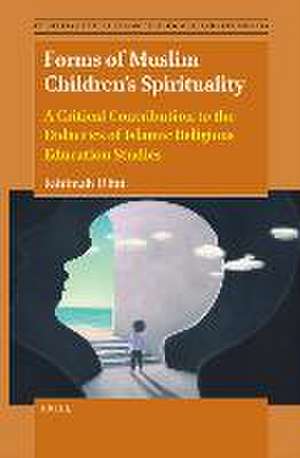Forms of Muslim Children’s Spirituality: A Critical Contribution to the Didactics of Islamic Religious Education Studies: Studies in Critical Pedagogy, Theology, and Spirituality, cartea 2
Autor Fahimah Ulfaten Limba Engleză Paperback – 7 dec 2022
The aim of this book is to provide a framework for the life of young believers in a religiously plural society, in which the individual relationship to God and the reflexivity of one's own religion are a decisive prerequisite for preventing radicalization and moral rigidity. This book favors an anthropological shift and an approach that takes the potential of children with their theology and their search for the meaning of life seriously.
Preț: 346.83 lei
Nou
Puncte Express: 520
Preț estimativ în valută:
66.39€ • 72.14$ • 55.80£
66.39€ • 72.14$ • 55.80£
Carte indisponibilă temporar
Doresc să fiu notificat când acest titlu va fi disponibil:
Se trimite...
Preluare comenzi: 021 569.72.76
Specificații
ISBN-13: 9789004533196
ISBN-10: 9004533192
Pagini: 336
Dimensiuni: 155 x 235 mm
Greutate: 0 kg
Editura: Brill
Colecția Brill
Seria Studies in Critical Pedagogy, Theology, and Spirituality
ISBN-10: 9004533192
Pagini: 336
Dimensiuni: 155 x 235 mm
Greutate: 0 kg
Editura: Brill
Colecția Brill
Seria Studies in Critical Pedagogy, Theology, and Spirituality
Notă biografică
Fahimah Ulfat, Ph.D. (2016), Friedrich Alexander University of Erlangen-Nürnberg, is Professor of Islamic Religious Education at the Center for Islamic Theology at the Eberhard Karls University of Tübingen. Her research interests include empirical studies on youth and religion, religion and gender, teacher professionalism and interreligious learning.
Cuprins
Acknowledgement
List of Figures
1 Introduction
1 Problem Context
2 Subject of the Study: The Action-Oriented Relevance of Relations to God
3 Methodological Approach
4 Structure of the Study
2 State of Research and Research Question
1 State of Research in the Field of Children’s Conceptions of God
2 Description of the Research Objective
3 Specifying the Research Question
3 Methodological Foundation and Methodological Approach
1 Methodological Decisions
2 Survey Method: Narrative Interview
3 Interpretation Procedure: Documentary Method
4 Strategy of Generating the Sample
4 Empirical Research Results
1 Short Portraits of the Interviewed Children in the Sample
2 Development of Typologies in the Present Study: Comparative Analysis and Theoretical Summarization
3 Basic Typology: Forms of Self-Relating
4 Type A: Relating of the Self to God in the Mode of Personalization
5 Type B: Relating of the Self to God in the Mode of Moralization and Orientation towards Tradition
6 Type C: Relating of the Self to Immanent Dimensions in the Mode of Distance from God
7 Summary: Types of Relations to God among Muslim Children
5 Discussion of the Research Results
1 Discussion of the Research Results in the Educational Context
2 Discussion of the Results in the Theological Context
3 Reflection on the Results Regarding the Importance of Religious Education
4 Summary
6 Conclusion
1 Introduction
2 Praxeological Suggestions
3 Suggestions for Further Research
Appendix: Sample Table
References
Index
List of Figures
1 Introduction
1 Problem Context
2 Subject of the Study: The Action-Oriented Relevance of Relations to God
3 Methodological Approach
4 Structure of the Study
2 State of Research and Research Question
1 State of Research in the Field of Children’s Conceptions of God
2 Description of the Research Objective
3 Specifying the Research Question
3 Methodological Foundation and Methodological Approach
1 Methodological Decisions
2 Survey Method: Narrative Interview
3 Interpretation Procedure: Documentary Method
4 Strategy of Generating the Sample
4 Empirical Research Results
1 Short Portraits of the Interviewed Children in the Sample
2 Development of Typologies in the Present Study: Comparative Analysis and Theoretical Summarization
3 Basic Typology: Forms of Self-Relating
4 Type A: Relating of the Self to God in the Mode of Personalization
5 Type B: Relating of the Self to God in the Mode of Moralization and Orientation towards Tradition
6 Type C: Relating of the Self to Immanent Dimensions in the Mode of Distance from God
7 Summary: Types of Relations to God among Muslim Children
5 Discussion of the Research Results
1 Discussion of the Research Results in the Educational Context
2 Discussion of the Results in the Theological Context
3 Reflection on the Results Regarding the Importance of Religious Education
4 Summary
6 Conclusion
1 Introduction
2 Praxeological Suggestions
3 Suggestions for Further Research
Appendix: Sample Table
References
Index

